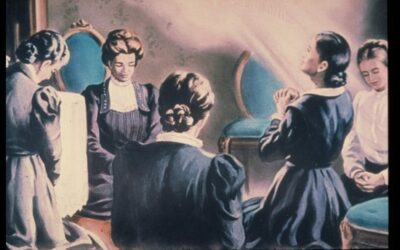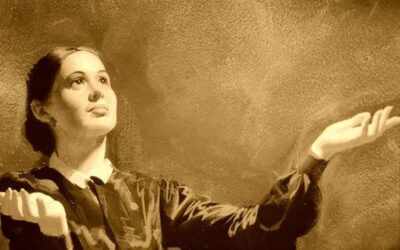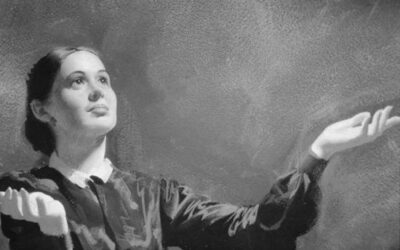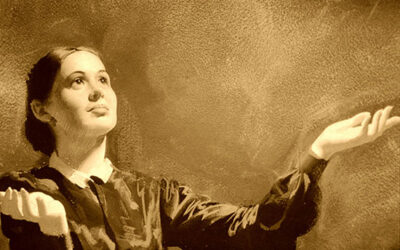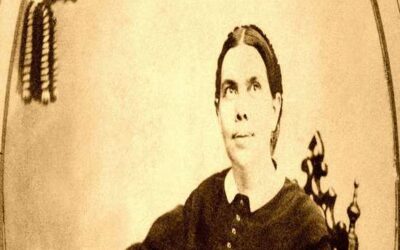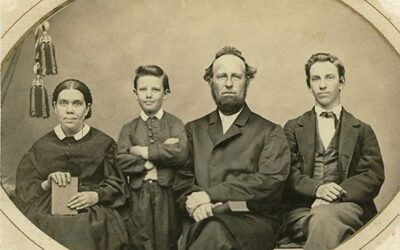We also see evidence of her calling in the way she helped guide the early Adventist Church. As a co-founder of the denomination, she had a profound impact on our development and history. She helped establish numerous Adventist institutions and provided spiritual counsel through books, letters, and speaking engagements.
Though she only ever referred to herself as a humble messenger, the Seventh-day Adventist Church believes Ellen White was inspired by the Holy Spirit because she demonstrated what the Bible describes as the spiritual gift of prophecy (1 Corinthians 14; Romans 12:4-8).
So let’s look more closely at these Bible verses, and compare them directly with the life and ministry of Ellen White.
We’ll cover:
- What the Bible says about prophets
- Misconceptions about prophets
- Whether Ellen White fulfilled the biblical tests of a prophet
- Additional responsibilities of prophets
- Did Ellen White consider herself a prophet?
Let’s begin with some basic definitions from Scripture.
What does the Bible say about prophets?
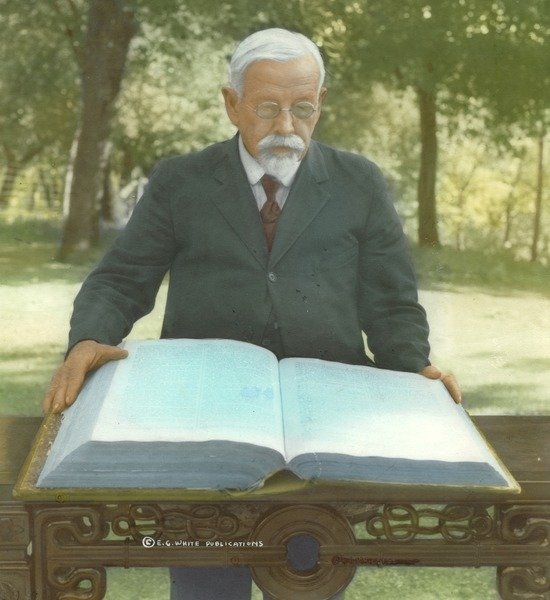
Courtesy of the Ellen G. White Estate, Inc.
The Bible defines a prophet as someone who shares God’s message, usually to a specific audience (Deuteronomy 18:18; Jeremiah 1:9-17). Sometimes these messages were for the citizens of Israel, which happened often when prophets served as judges. And quite often, the messages spoken by prophets were directed toward those in power (2 Kings 22:15-20).
Regardless of the intended audience, however, a prophet often served as a source of spiritual insight for the people. God would work through this person to help people apply His Word to everyday life.
Prophets also would serve as a spiritual guard of sorts, reminding people what the Bible actually says and cautioning them not to twist biblical principles to serve personal purposes. Or, if it came to it, rebuking those who acted against what they knew was right.
For Ellen White, the above descriptions still fit. She was inspired to write numerous books to help people apply biblical principles to each area of their lives. She also helped revive important theological principles early Protestants had long forgotten—like keeping the seventh-day Sabbath and the nearness of Christ’s second coming.
God also gave Ellen White deeper insight into the challenges people experienced in her community. This enabled her to offer comfort, counsel, and correction where necessary.
And as strange as it may sound, much of this insight came from visions she received from the Holy Spirit.
If you look through the Bible, you find God communicating with prophets through visions very frequently (Numbers 12:6).
Some received straightforward messages to accomplish a particular mission, as Jonah did when he was told to go to Nineveh (Jonah 1:2).
Sometimes God gave visions that were symbolic. In the New Testament, Peter received a vision of a sheet filled with different animals to help him understand that people of all races and backgrounds should be considered equal when it comes to the body of Christ (Acts 10:10-35).
Other times, prophets were given vivid, vibrant dreams full of metaphors, symbolic images, and predictions of future events, like Isaiah, Ezekiel, and Daniel.
But all through post-biblical history and today, the idea of relaying messages from God or predicting the future is looked upon with skepticism.
(Maybe because it sounds too fantastic to be true! Or maybe because so many people have claimed to predict the future and have been wrong.)
But when it comes to the prophets in the Bible, everything they predicted has come to pass (except for events yet to happen).
And not only did prophets predict the future, many also performed extraordinary miracles. Moses proclaimed the 10 plagues God would bring upon the stubborn Egyptians. Elijah asked God to send fire from heaven (1 Kings 18: 36-38), and Elisha multiplied a widow’s supply of oil for cooking so they wouldn’t run out of food (2 Kings 4:1-7).
While miracles aren’t a biblical test for a prophet, Ellen White accomplished some amazing feats as well, through God’s power. One of the most remembered occurrences was while she was in vision, she held a large, heavy Bible as high as she could reach, in one hand, for hours without tiring.1
And she did this while pointing to and reciting Bible verses without even looking at the pages.2
But even when prophets started to gain attention for the miracles they performed, or the visions they had—they didn’t call attention to themselves.
Unlike false prophets who can sometimes perform “miracles” with the help of evil angels, true prophets give God credit for everything (Genesis 41:15-16).
In short, true prophets are not looking to serve themselves. Instead, they’re looking to serve those around them—and in doing so, serving God.
In many cases, prophets were responsible for leading groups of people. They often lead them through difficult times or decisions, showing them that God will not abandon them even when things seem hopeless.
We see this to be true when Haggai encouraged the Israelites to build the temple even though it seemed hopeless (Haggai 2:1-9).
Ellen White was also responsible for leading fellow believers out of the Great Disappointment. She encouraged them to keep searching Scripture when many of them felt like giving up on God altogether.
But not everyone appreciated the Bible prophets. Elijah was hunted by his own king for years (1 Kings 19:1-3). Jeremiah was thrown into a dry well to starve (Jeremiah 38: 1-10).
While Ellen White didn’t receive any death threats that we know of, she did certainly have to deal with rumors, suspicion, and naysayers. Usually from fellow Christians.
But the real point here is that God’s prophets weren’t revered celebrities. Their objective and motivation is to be servants and messengers of God. And at times, that means even at the cost of safety, reputation, and welfare.
Many prophets were hated and persecuted by the very people they were trying to help.
So if Scripture has taught us anything, it’s that being a prophet doesn’t require popularity—and it certainly doesn’t cause it either. Sometimes it causes outright enemies.
In Ellen White’s case, she didn’t aspire to become a prophet. She was chosen—in much the same way as many prophets of the Bible. She didn’t have any lofty goals of becoming a respected spiritual leader.
After her calling, as she realized the importance of the messages she was given to pass along, she prayed for God to humble her and keep her from pride. She attributed all her success to God’s leading in her life. And she didn’t refrain from telling the truth, even if the truth was unpalatable.
Like the Bible prophets before her, she faithfully obeyed what God asked her to do.
Misconceptions about prophets

Photo by Artem Maltsev on Unsplash
Now that we’ve addressed the Bible’s descriptions of prophets, let’s address some common misconceptions that can be prevalent in media, pop culture, stories, and everyday conversation.
We recognize that the word “prophet” is often met with suspicion. Or it brings up mental pictures of strange or fantastical people who are often out of touch with reality. But let’s take another look at what the Bible says about what a prophet really is…and what it isn’t
Some common misconceptions about prophets are that:
- Only true prophets can perform miracles. Passages of Scripture show how false prophets will perform all kinds of tricks and illusions that appear as miracles (Exodus 7:11; Mark 13:22; 2 Thessalonians 2:9).
- Prophets should be worshiped. Prophets do not ask people to worship them. In fact, they would shut down any hint of worship toward them (1 Corinthians 1:12-17). They only ask people to worship God (Acts 14: 8-18). Likewise, Ellen White spoke out against those who would quote her words when it was Scripture that should be quoted.3
- Prophets are superhuman. Prophets are regular people. They make mistakes, get hurt, and at times struggle to follow God, just like the rest of us (Jonah 1: 1-2). Ellen White was a regular woman. She suffered from poor health most of her life. She also had to deal with significant frustration and discouragement, just like most of us, as well as heartwrenching grief as she lost two sons.
- Prophets are mystics. True prophets are never involved with spiritualism or mysticism. Mystics are false prophets (Deuteronomy 18:10-13). They’re not led by the Holy Spirit, but by demonic forces. In fact, Ellen White was in strong opposition to the mystic movements of her time.4
- Prophets can derive their power from multiple sources. If a prophet claims to derive their power from anything other than God—another deity, a crystal ball, or their own abilities—you can know for sure that they’re a false prophet. Ellen White only claimed her gifts came from God.
- Prophets are rich and prosperous—and want to make others rich and prosperous, too. Most of the prophets in the Bible led modest lives. Many were even homeless. But God took care of them.
Ellen White and her husband suffered many instances of financial hardship, sometimes even going without food.5 And if a self-proclaimed prophet brings attention to their wealth or prosperity, that’s a red flag right there.
In Acts 8 we can read about Simon, a sorcerer who thought he could buy the power of the Holy Spirit. He wanted to do what the apostles were doing so he wouldn’t lose his following. And as you can guess, he was rebuked.
- The work of a prophet is shrouded in mystery and strange rituals. False prophets have been known to take part in strange and dangerous rituals, often to make their knowledge and abilities seem otherworldly and unattainable (1 Kings 18:28).
But the work of a true prophet involves prayer and humility (1 Kings 18:36-37). Even when God asks His prophets to do strange things, He does it for communicative purposes.
For example, God told Ezekiel to lay on his side for many days to symbolize the years Israel lived in sin. Ezekiel didn’t choose to do that for some sort of demonstration of strength or power (Ezekiel 4:1-7).
- Everything a prophet says is for everyone, everywhere, at every time. Prophets’ messages can certainly be an inspiration to everyone. But more often than not, God had His messengers speak to a specific group of people, or even just to one person. And the message often had to do with the current challenges facing them. Take Jonah for instance. His message was for the Ninevites. He wasn’t rebuking anyone else at that time, although other nations could learn from Jonah’s message to turn away from sin and worship God.
In the same manner, Ellen White’s writings are understood in the context of the time they were written. While there are important principles we can draw from some of her messages to specific people or groups, we acknowledge that not everything she said is directly applicable to our lives today.
- The use of prophets is an outdated concept. Prophets weren’t just a product of the Old Testament. There were also New Testament prophets like Anna and John the Baptist (Luke 2:36; Matthew 11:9-11). Plus, we’re told that the Holy Spirit gives prophecy as one of the spiritual gifts (Romans 12:6-7; 1 Corinthians 14) and that as the Second Coming draws nearer, God will call upon many people to prophesy in His name (Acts 2:17).
- Only an adult male can be a prophet. The Holy Spirit doesn’t discriminate when it comes to the prophetic gift. Many women in the Bible were considered great prophets, such as Deborah (Judges 4:4-5), Miriam (Exodus 15:20-21), and Anna (Luke 2:36). And Samuel was called to be a prophet before he was even 12 years old.
With these misconceptions out of the way, it’s a lot easier to see why God can, does, and will still use prophets up until the day Jesus returns at the Second Coming.
God has prioritized communication with humans since He created them. He’s talked to them through the Bible, but also through the words of the prophets—especially when they needed to be reminded of what the Bible actually says.
Prophets may not be as high-profile today as they seemed in the Bible, but that doesn’t mean God isn’t still using people in that role. There may be hundreds or thousands of prophets serving God around the world right now. Just because they’re not delivering messages to us doesn’t mean they’re not active!
Does Ellen White fulfill the tests of a prophet?
But if we’re ever unsure if we’re encountering a prophet or not, the Bible does provide guidance on discerning between a true prophet and a false prophet. In fact, we’re encouraged to test all prophets and prophecies (1 John 4:1). And a true prophet must meet ALL these standards.
So what exactly are these tests? And does Ellen White pass them?
You can find the complete list of tests of a true prophet here: “6 Ways to Tell if Someone is a True Prophet.” But let’s get a quick overview of the standards a prophet must meet.
- Their messages completely align with the Bible (Isaiah 8:20): Ellen White uses Bible verses throughout her writings to help people understand where they could find the ideas she was expressing. She also encouraged fellow believers to test her words against Scripture and study for themselves.6
- They are clearly striving to have a character like Christ (Matthew 7:16-20): Prophets are by no means perfect or sinless—but their habits should generally reveal that their goal is to be like Jesus Christ. And if they ever falter, they should be humble enough to admit it.
The people that knew Ellen White frequently commented on her service to God. When she died, a newspaper column spoke on the compassionate and selfless life she lived.7
- If they make predictions, they should come true without error (Jeremiah 28:9): If a prophecy mentions a predicted outcome (rather than a conditional outcome, like in the case of Jonah and Nineveh), Scripture tells us to compare these predictions with how things have played out.
It’s important to remember two things, however.
First, false prophets can make predictions that come true, too—this is why no one single test is sufficient to determine if someone is a true prophet (Deuteronomy 13:1-3). A true prophet meets all the criteria.
Second, a true prophet might make a prediction that doesn’t come true if the prophecy was conditional upon certain decisions, like Jonah’s prophecy to Nineveh.
Ellen White was given insight about future events, many of which appear in The Great Controversy. But one of her most notable predictions was about coming judgment on San Francisco and Oakland.8
Some of her predictions have yet to come to pass, however. But with her track record so far, along with what we’re told in the Bible, we have an idea of what kinds of future events are in store for the world.
Does Ellen White fulfill the duties of a prophet?
A prophet’s calling is to share God’s message in whatever manner He specifies. There are also tasks and responsibilities that usually accompany this calling. And just as the prophets of the Bible did these things, so did Ellen White.
These duties often include:
- Traveling to spread the word. Jonah traveled to Nineveh with a very specific message. The apostles traveled all over, inspiring the spread of the early Christian church. Paul continued on that mission, traveling and preaching to different groups of believers about the unique challenges each group was facing. And Ellen White traveled all over the world to share how the truths found in the Bible are only becoming more and more relevant—and urgent, as we get closer and closer to the Second Coming.
- Writing down God’s messages to share. Most of the books in the Bible on the prophets were written by the prophets themselves. And after John experienced visions about heaven, the end times, the judgment, and more, he was commanded by an angel to write down what is now known as the book of Revelation (Revelation 1:19). And at the end of Ellen White’s ministry, she had written over 100,000 pages of spiritual and practical counsel to Christians.9
- Carefully relating visions and dreams. Prophets all throughout the Bible were careful to describe the visions God gave them. Ellen White did the same, describing what she saw in as much detail as possible.
- Balancing spiritual responsibilities with caring for their families and/or doing their jobs.
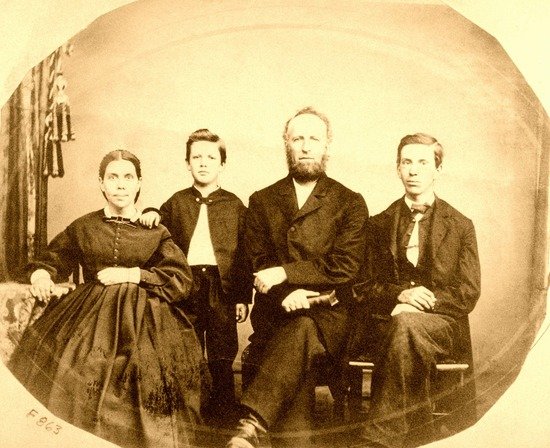
Courtesy of the Ellen G. White Estate, Inc.
Part of Hosea’s duty as a prophet was caring for his family (Hosea 3:1), and during and after being a disciple of Jesus, Peter was still a fisherman (John 21:3). And Paul, while traveling and preaching, supported himself by being a tentmaker (Acts 18:3). In the same manner, Ellen White made sure she maintained her practical, daily responsibilities. She didn’t rely on her prophetic gift for financial profit or to relieve her from her responsibilities as a mother and homemaker.10
- Confronting or calling out people who were causing problems. Being a prophet sure isn’t an easy job. They’d be up against doubt, mockery, and even persecution. But one of the hardest things a prophet had to do was deliver reproof.
Ellen White had an especially difficult time with it. She hated delivering messages of correction. It’s naturally an uncomfortable process, and she didn’t like the idea of causing people to feel bad.11
Even Jesus struggled with sharing upsetting messages, such as when He talked about the destruction of Jerusalem’s temple (Luke 19:41-44).
Prophets generally don’t take pleasure in correcting or bringing judgment on people (with the exception of Jonah). But because they care about the people they’re serving for God, they have to be honest.
At first, Ellen White didn’t want to be that kind of messenger. And several Bible prophets felt similarly. So many of them told God to pick someone else to do His work (Exodus 4:10-17; Judges 6:15-16; Jeremiah 1:6).
But she knew she had a job to do. No matter how difficult it got, she was determined to follow God’s will for her life. And in turn, to direct others to the promise of His salvation and the peace that can bring.
Did Ellen White consider herself a prophet?
In actuality, Ellen White never called herself a prophet. Instead, she called herself a messenger.12
Ellen White said she did not claim the title of a prophet because most people who have the boldness to claim the role of a prophet are often false prophets, using their title to manipulate others and distort the truth.13 She also felt her role went beyond prophesying—she was also called to write, preach, and minister to those who were poor and disadvantaged.14
So she wasn’t saying she didn’t have the spirit of prophecy from the Holy Spirit. She just wasn’t keen on using it as a title.
So then why does the Adventist world church call her a prophet?
Well, at first, early Adventist pioneers like Joseph Bates were skeptical of Ellen White’s gifts.15 But once they got to know her and started studying her writings, they agreed she was being guided by the Holy Spirit.
God gave her visions that helped point the disappointed Millerite people back to Him. Her prophetic guidance helped them connect and study passages of Scripture that formed the beliefs Adventists hold today—such as the Sabbath, the Investigative Judgment, and the Second Coming.
And she followed God’s leading to write down the information she was given, which appeared in magazines like the Review and Herald and in her books. Some of her most popular works include the Desire of Ages, The Great Controversy, and Steps to Christ.
But when it comes down to it, we describe her as a prophet because she met the description and passed the Bible’s tests. And defining her accurately helps us understand the purpose and significance of the messages she shared.
When people asked John the Baptist if he was a prophet or not, he also didn’t claim the title (John 1:8, 21). But Jesus described him as a “messenger” (Matthew 11:9-11, ESV), and John even acknowledged the passage of Scripture that identified him as the “voice of one crying out in the wilderness, ‘Make straight the way of the Lord…’” (John 1:23, ESV).
So whatever the reasoning behind the claiming or not claiming of the “prophet” title, we can recognize that Ellen White was inspired and empowered by the Holy Spirit.
It’s a way of glorifying God as well, since we’re acknowledging the amazing things He did through her. He is the real power behind any prophet.
And praising God, acknowledging His blessings, sharing His Word, and following His leading is what the Seventh-day Adventist Church is all about.
Want to learn more about who Ellen White was and what she did? Read her bio or
- Douglass, E. Herbert, Messenger of the Lord, (1998), p. 146. [↵]
- Ibid. [↵]
- White, Ellen G., Selected Messages, Book 3, p. 33. [↵]
- Ibid, p. 160. [↵]
- Ibid, p. 74. [↵]
- “The Test Results Pt. 3.” [↵]
- “The Test Results Pt.4.” [↵]
- “The Test Results.” [↵]
- Ibid, p. 108. [↵]
- White, Ellen G., I’d Like to Ask Sister White…”, p. 67. [↵]
- Douglass, E. Herbert, Messenger of the Lord, (1998), p. 157. [↵]
- https://whiteestate.org/about/issues1/unusual/out-context/i-do-not-claim-be-prophetess/. [↵]
- Ibid. [↵]
- Ibid. [↵]
- Fortin, Denis, “Ellen G. White and the Gift of Prophecy: The Test of a Prophet”. [↵]
Related Articles
More Answers
8 Pieces of Advice from Ellen White’s Counsel for Families
8 Pieces of Advice from Ellen White’s Counsel for FamiliesFamily—it can be the source of the most wonderful and frustrating parts of life. And it’s in the family that individuals develop their identities and learn the behaviors that either propel them forward or...
Ellen White’s Visions and Prophecies
The New Testament upholds prophecy as a spiritual gift that will continue to the end of time (Ephesians 4:11–14).
Ellen G. White’s Counsel on College Education
Ellen G. (Harmon) White, a significant co-founder of Adventism, is often known for her practical and spiritual guidance for proper childhood education. But she was also significantly involved in the development of Seventh-day Adventist higher education.
Ellen G. White or the Bible—Which is More Important to Adventists?
The Bible—without a shadow of a doubt—is the most important book. It’s the standard we use to test all other writings, including those of Ellen White.
Do Adventists Worship Ellen White?
Ellen White was a co-founder and leader in the Seventh-day Adventist Church from its beginning. Adventists believe that she had the prophetic gift (Ephesians 4:14; 1 Corinthians 12:28) and passes the biblical tests of a prophet.
Ellen White and the Sabbath
The Sabbath is an important topic in the Seventh-day Adventist Church. It shouldn’t surprise you, then, that Ellen G. White, a co-founder of the church, studied the Bible’s teachings on the Sabbath and wrote large amounts about it.
Are Any of Ellen G. White’s Prophecies Yet to Come True?
Yes. Some prophesied events have yet to happen. Ellen White, a co-founder of the Seventh-day Adventist Church, demonstrated many times over that she had the spiritual gift of prophecy (1 Corinthians 12, 14). Some of her predictions’ timelines have already passed, and those prophecies have been fulfilled.
What Ellen G. White Said About Using the Bible in Education
Ellen White, one of the founders of the Seventh-day Adventist Church, believed that education was not complete unless it was founded upon the principles of the Bible.
Ellen G. White’s Counsel on Christian Education
Ellen White, a co-founder of the Seventh-day Adventist Church, saw that the educational system during her time was lacking and looked for ways to improve it—not only in the United States but throughout the world. And as part of her life of ministry, she sought out practical ways to be better stewards of our minds, bodies, and the lives we’re given.
What Was Ellen G. White’s Counsel on Music?
At its core, music is a collection of tones, sounds, and rhythms that creates a melody. It’s also much more than that.
How Ellen White’s Teachings Can Improve Your Health
Healthcare in the nineteenth century was said to leave “more disease than it took away” with its use of bloodletting and “medicines” like mercury and arsenic. As people questioned these methods, new approaches popped up. But which ones were reliable?
Ellen White’s Spiritual Counsel on Marriage
As one of the founders of the Seventh-day Adventist Church, Ellen G. White was held in high regard. She was a prolific author and was heavily engaged in the mission of the denomination, prayerfully pursuing the guidance of the Holy Spirit.
Were All Ellen White’s Books Inspired?
As the most translated female author in the world, Ellen White wrote numerous books, articles, pamphlets, and more. These writings focused on developing Christian character, emphasizing Bible truth, practical tips for living well and staying healthy, and discussing effective methods of delivering the gospel message to the world.
What is the Spirit of Prophecy?
The Spirit of Prophecy, one of the spiritual gifts of the Holy Spirit, is described as “the testimony of Jesus” (Revelation 19:10) and, according to Belief 18 of the 28 Adventist Fundamental Beliefs about Scripture, it will be one of the distinctive characteristics of the remnant of devout believers in the end times (1 Corinthians 14:1-5; Revelation 19:10; Revelation 12:17).
How Ellen White Influenced the Adventist Health Message
Seventh-day Adventists are known for their emphasis on healthy living. And Ellen G. White was a significant influence in the development of this priority and practice among Adventists.
What Did Ellen White Say About End-Time Prophecy?
We can read in Scripture about the series of events and signs that lead up to the second coming of Jesus Christ. And it sounds pretty intense, to say the least. The symbolic nature of the language of prophecy also can make things tricky to understand at first.
What Were Ellen White’s Visions About the Adventist Church?
Led by the Holy Spirit, Ellen G. White was given many messages, counsel, revelations, and visions about the Bible, history, prophecy, and how we can apply biblical principles to our daily lives.
Ellen G. White’s Travels and Worldwide Mission
Though Ellen White, a co-founder of the Seventh-day Adventist Church, is best known for her ministry in the United States, she also traveled to twelve other countries in her lifetime—a big accomplishment in the 19th century when travel was strenuous and long.
Were All Ellen White’s Visions About the Future?
While the visions God gave Ellen White were often about the distant future or last-day events, she had many others that addressed different topics. They may not be discussed as much as her visions about the Second Coming or the End Times, but they tackled some timely topics for her day.
Ellen White and Adventist Healthcare—Ahead of Their Time
Medical care in the mid-1800s was primitive, to say the least. Basic concepts we take for granted—such as proper handwashing or recognizing the dangers of bloodletting—were nonexistent. And doctors often had little more than nine months of training!
What is the Spirit of Prophecy (Books 1–4) by Ellen G. White?
Applying biblical prophecy to history, recent events, and especially the future, can be a daunting task. Even a little scary for some. But even so, we can’t help but want to know more. We want to be prepared—to feel like we know how to weather the storm.
What Did Ellen White Teach About Vegetarianism?
One thing you might have heard about Seventh-day Adventists is their emphasis on a vegetarian lifestyle. If you’re wondering why that is, it goes back to our church’s humble beginnings:
What Does Ellen White Say About Prayer?
Have you ever had a burden you just had to tell someone, but you were afraid of being judged if you did? Ellen G. White, an important figure in the Seventh-day Adventist Church and a prolific writer, described prayer as talking to God in a personal way—He’s the friend we can tell everything to.
Who Were Ellen White’s Children?
Being the children of a woman with a prophetic calling from God had its blessings and its challenges.
In this overview, we’ll look at the highlights of the lives of Ellen White’s sons during her many years of ministry, as well as the ways each of them decided to serve Jesus Christ:
Steps to Christ: A Guide to a Relationship with Jesus
Whether you’re just starting your journey with Jesus Christ, are coming back after some time away, or have had a relationship with Jesus for years, using a book—in addition to the Bible—to guide or supplement that relationship can be helpful, comforting, and joyful.
How Can I Know Ellen White’s Messages Were From God?
It’s natural to be a bit skeptical when you hear about someone being “divinely inspired,” or that something is a “message from God,” etc. And we expect nothing different if you’re hearing about Ellen White, an influential co-founder of the Seventh-day Adventist Church, for the first time. After all, the Bible tells us that we’re supposed to test these things!
Was Everything Ellen White Said Divinely Inspired?
The Seventh-day Adventist Church believes that many of Ellen White’s messages were inspired by God. But that doesn’t mean everything she ever said was prophetic, or meant to be taken as direct instruction from God.
Ellen White and the Great Controversy
The Great Controversy is a book written by Ellen G. White, a co-founder of the Seventh-day Adventist Church. Written in the late 1800s, the book is the last in a series and describes the connection between Bible prophecy and post-biblical history. It also discusses factors that will characterize last-day events.
How Did Ellen G. White Help Found the Adventist Church?
Ellen G. White, a humble woman from Gorham, Maine, was a co-founder of the Seventh-day Adventist Church and a key leader in it from its very beginning. Following the Holy Spirit’s guidance at a young age, she dedicated herself to studying Scripture and became involved in the Advent Movement.
Didn’t find your answer? Ask us!
We understand your concern of having questions but not knowing who to ask—we’ve felt it ourselves. When you’re ready to learn more about Adventists, send us a question! We know a thing or two about Adventists.





